一般过去时态的用法和答题技巧
【英语】英语一般过去时(一)解题方法和技巧及练习题及解析
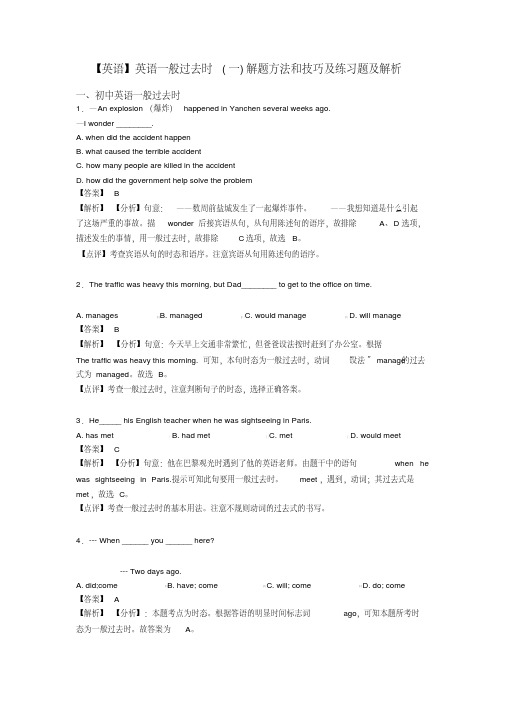
【英语】英语一般过去时(一)解题方法和技巧及练习题及解析一、初中英语一般过去时1.—An explosion (爆炸) happened in Yanchen several weeks ago.—I wonder ________.A. when did the accident happenB. what caused the terrible accidentC. how many people are killed in the accidentD. how did the government help solve the problem【答案】 B【解析】【分析】句意:——数周前盐城发生了一起爆炸事件。
——我想知道是什么引起了这场严重的事故。
描wonder后接宾语从句,从句用陈述句的语序,故排除A、D选项,描述发生的事情,用一般过去时,故排除C选项,故选B。
【点评】考查宾语从句的时态和语序。
注意宾语从句用陈述句的语序。
2.The traffic was heavy this morning, but Dad________ to get to the office on time.A. managesB. managedC. would manageD. will manage【答案】 B【解析】【分析】句意:今天早上交通非常繁忙,但爸爸设法按时赶到了办公室。
根据The traffic was heavy this morning.可知,本句时态为一般过去时,动词“设法”manage的过去式为managed。
故选B。
【点评】考查一般过去时,注意判断句子的时态,选择正确答案。
3.He_____ his English teacher when he was sightseeing in Paris.A. has metB. had metC. metD. would meet【答案】 C【解析】【分析】句意:他在巴黎观光时遇到了他的英语老师。
一般过去时态的结构及用法

一般过去时态的结构及用法一般过去时是英语中用来描述已经发生或已经完成的动作、状态或事件的时态。
它常用于叙述过去的经历、故事或历史事件。
一般过去时态的结构基本上由一个动词的过去式构成,而且不需要使用助动词来表示时间。
以下是一般过去时的结构及用法的相关参考内容:一、结构:1. 肯定句结构:主语 + 动词过去式 + 其他成分例句:I studied English last night.2. 否定句结构:主语 + 动词过去式 + not + 其他成分例句:She did not go to the party.3. 疑问句结构:助动词 (did) + 主语 + 动词原形 + 其他成分 + ?例句:Did they watch the movie?二、用法:1. 表示过去的经历或事件:例句:I visited my grandparents last summer.We went to the beach yesterday.2. 表示过去的习惯或状态:例句:He used to smoke, but he quit last year.We lived in London for ten years.3. 在时间状语从句中:例句:I saw her while I was walking home.He was cooking dinner when the phone rang.4. 与过去的比较或对比:例句:She was much taller when she was young.It was colder last winter than this winter.5. 与现在进行时态的对比:一般过去时表示的是过去的动作或状态,而现在进行时表示的是现在正在进行的动作或状态。
例句:Last night, I studied for the exam. (过去发生的动作)Right now, I am studying for the exam. (现在正在进行的动作)6. 与过去进行时态的对比:一般过去时表示的是过去的动作或状态,而过去进行时表示的是过去某个时间点正在进行的动作。
一般过去时的用法

般过去时的用法一般过去时表示过去某个时间发生的动作或存在的状态,也表示过去经常或反复发生的动作。
谓语动词要用动词的过去式,常和表示过去的时间状语连用,女口:yesterday 昨天,last night 昨晚,last week 上周,last year 去年等。
一.一般过去时的结构(可分两类不同的结构)1. Be 动词的一般过去时在没有实义动词的句子中使用be 动词,am/is 的过去式为was ;are 的过去式were。
肯定句式:主语+be (was/were) + 其他.否定句式:主语+be (was/were) +not + 其他. 一般疑问句:Be (was/ were) + 主语+其他。
2. 实义动词的一般过去时态肯定句要使用动词的过去式,否定句和疑问句要使用助动词do/does 的过去式did.肯定句式:主语+动词(过去式)+ 其他。
否定句式:主语+ didn 't +动词(原形)+其他(did not= didn 't)一般疑问句:Did +主语+动词(原形)+ 其他(do, does 的过去式均为did)? 注: 1.did 和didn 't 是构成一般过去时的助动词,其特点是要在其后跟动词的原形。
2. 实义动词do 的一般过去时,例:Jim went home yesterday. --- Jim didn ' t go home yesterday.(否定句)--- Did Jim go home yesterday?(一般疑问句)--- What did Jim do yesterday?(特殊疑问句)二.一般过去时的判断标志词:yesterday,the day before yesterday,last+ 时间,this morning, 时间+ago,just now,a moment ago,in+ 过去的时间注意:一般过去时表示过去经常或反复发生的动作,常和often 经常,always ,总是,once a week 一周一次,等表示频度的时间状语连用动词过去式变化规则:1. 一般在动词末尾加ed, 如:pull--pulled, cook--cooked, play--played2. 结尾是e 力口d,女口: taste--tasted, live--lived, use--used3. 末尾是辅音字母加一个元音字母的重读闭音节,应双写末尾的辅音字母,再力口ed,女口:stop-stopped, plan--planned4. 以“辅音字母+y ”结尾的,变y为i,再加ed,如:study-studied5. 不规则动词过去式:(见课后)过去时练习选择( ) 1.What __________ they ____________ dinner yesterday?D.wanted; buyA.do; have forB.did; had for;C. LeavedD.was leaving( )2.Could you tell me what time _______________ t he plane?A.leftB.leavesC.leavedD.left( )3.One of us ______________ band last month.A. leavesB. leaveC.leavedD. left( )4.Where _______________ your mother born?A.areB. wasC.wereD.is ( )5.Do you know why he _______________ for class last year?A.was always lateB.always was lateC.is late alwaysD.is always late( )6.I got up _______________ this morning. So I ________ breakfast and went to school.te, didn 't haveB. Early, didn 't havete, hadn ' tD.early, hadn 't( )7.It ______________ much cold today than it ___________ yesterday.A.is, isB.was, wasC.is, wasD.was, is ( )8.He didn ' t come __________ goodbye to us and ________ away.A.say,goB.say, wentC.to say, wentD.to say, go( )9.Her pen was broken.She ________ to _______ a new one.A.wants, buysB.wanted, boughtC.wants,bought ( )10.I thought the dress ________ really pretty.A.isB. wasC./D.were( )11.I ______________ tired now, but it __________ an exciting day.A.am, wasB.was,wasC.was,isD.am,is( )12.He said he ____________ go to cook dinner for us.A.willB.wouldC./D.doesn ' t( )13.I stayed in the sitting room and _________ my friends all the time.A.talk toB.talkedC.talk aboutD.talked to( )14.She also __________ her _____ in a 1990s style.A.weared;hairB.wore;hairC.wear;hairD.wears;hairs( )15.I went to see you last Saturday, ________ t here _____ nobody inthe room.A. but;wasB.and;wereC.and;wasD.but;is二、用所给词的适当形式填空1. He put the books away and ________ (go)home.2. The boy is running and ________ (tie)his shoes on the playground.3. My father ________ (buy) a new computer for _________ (I)yesterday.4. He often ___________ (go)to school by bike,but last year heoften ___ (walk)to school.5. After she finished _________ (pack )everything,she ______________ (go)to school.6. ----Who ____ (wash)the plates on the table?----Jenny did.7. ----When ___ you _____ (see)the film “ Titanic ” ?8. It' s half past eleven now.Jim ____ (have)lunch.He usually ____ (have)itat this time.9. She _______ (write)to Jill last month.She __________ (write) to him nexttime.10. The students _____ (stop)talking when their teacher came up.三、句型转换1. The children had a good time in the park.否定句:____________________________________________________一般疑问句:________________________________________________________对划线部分提问:________________________________________________________ 2. There were about nine hundred people at the concert.( _____ 音乐会)对划线部分提问:________________________________________________________ 一般疑问句:________________________________________________________否定句:____________________________________________________3. There was only one problem.否定句:____________________________________________________一般疑问句:________________________________________________________肯定/否定回答:_________________________________________________________ 4. A nn did her homework yesterday eve ning.否定句:____________________________________________________一般疑问句:________________________________________________________对划线部分提问:________________________________________________________ 5. Last week I read an English book.否定句:____________________________________________________一般疑问句:________________________________________________________肯定/否定回答:_________________________________________________________ 对划线部分提问:________________________________________________________2. Frank read an interesting book about history._________ Frank ___________ an in terest ing book about history?3. He' s cleaning his rooms.____________ he ________________ ?4. Why not go out for a walk?__________ _________ __________ ___________ out for a walk? 5. Thomas spent RMB 10 on this book.Thomas __________ __________ RMB 10 on this book.6. My family went to the beach last week.___________ ___________ ___________ family ________ last week?7.I didn ' t have any friends.___________ __________ have ___________ friends?8.I think she is Lily 's sister.9. Sally often does some reading in the morning.Sally _________ often _________ some reading in the morning.10.He is a tall boy._________ _________ he __________ __________ ?六.翻译下列句子1.我过了一个忙碌却又刺激的周末。
一般过去时时态
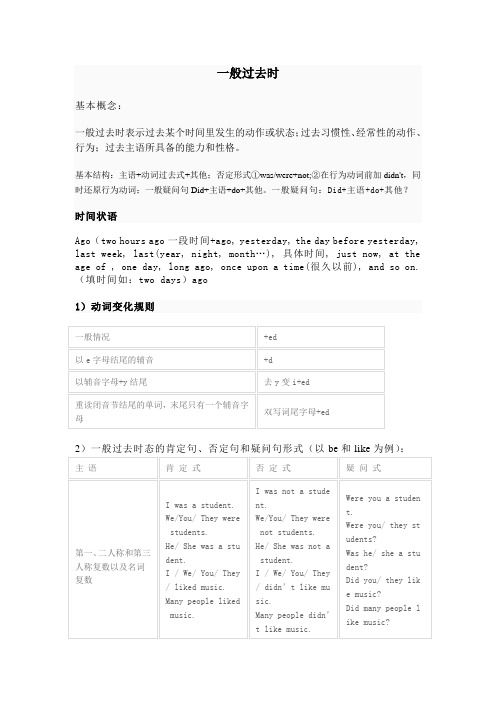
一般过去时基本概念:一般过去时表示过去某个时间里发生的动作或状态;过去习惯性、经常性的动作、行为;过去主语所具备的能力和性格。
基本结构:主语+动词过去式+其他;否定形式①was/were+not;②在行为动词前加didn't,同时还原行为动词;一般疑问句Did+主语+do+其他。
一般疑问句:Did+主语+do+其他?时间状语Ago(two hours ago一段时间+ago, yesterday, the day before yesterday, last week, last(year, n ight, month…), 具体时间, just now, at the age of , one day, long ago, once upon a time(很久以前), and so on.(填时间如:two days)ago1)动词变化规则2)一般过去时态的肯定句、否定句和疑问句形式(以be和like为例):3)一般过去时的用法:1.过去发生的动作。
例如:The police stopped me on my way home last night.2.过去存在的状态。
例如:They weren't able to come because they were so busy.3. 常用于一般过去时的时间状语:yesterday,three months ago,last year,in 1979,often,always 例题解析:举一反三,学的更轻松!1. r. Mott is out. But he ______ here a few minutes ago.A. wasB. isC. will beD. would be解析:时分钟前发生的动作,应该用一般过去时。
应选 A,2.---Hi, Tom.---Hello, Fancy. I ______ you were here.A.don't knowB.won't thinkC. thinkD. didn't know解析:虽然句中没有明确的时间状语,但是可以通过上下文语境判断出,我说这话之前不知道,但是现在知道了,表示过去的动作,要用过去时态。
小学生如何准确使用一般过去时

小学生如何准确使用一般过去时
一般过去时是英语语法中的一个基本时态,用于表示过去发生的动作、事件或状态,也是英语考试常考的内容之一。
那么小学生如何准确使用一般过去时呢?以下是几点建议。
了解动词过去式
使用一般过去时需要用到动词的过去式,因此小学生需要首先掌握常见动词的过去式。
例如:
- play → played
- eat → ate
- watch → watched
- study → studied
- dance → danced
当然还有不规则动词的过去式,例如:
- be → was/were
- have → had
- go → went
- do → did
- see → saw
小学生可以通过课本、练册等工具研究和记忆这些动词的过去式。
切换思维方式
使用一般过去时需要将思维模式从现在转变为过去。
小学生可以通过以下方式帮助自己切换思维:
- 听老师或其他同学用过去时叙述一些事件或故事
- 阅读课外书籍并用过去时复述故事情节
- 练默写过去时的句子和短文
这样可以帮助小学生熟悉和适应使用一般过去时。
多练
练是掌握任何技能的关键,小学生需要通过大量阅读和写作练来巩固和加深对一般过去时的理解和掌握。
建议小学生可以完成以下练:
- 阅读一些简单的故事或文章,并用过去时复述
- 完成练册中的一般过去时练题
- 写一篇自己的日记,使用一般过去时叙述过去发生的事情
以上是几点帮助小学生准确使用一般过去时的建议。
希望对小学生们的英语学习有所帮助!。
英语一般过去时的用法大全及答案解析

英语一般过去时的用法大全及答案解析一、初中英语一般过去时1.My mind wasn't on what he was saying so I'm afraid I ____________ half of it.A. missedB. was missingC. will missD. would miss【答案】A【解析】【分析】句意:本题翻译为:我的心思不在他刚才所说的内容上,所以我担心我刚才错过了一半的内容。
A. missed一般过去时;B. was missing过去进行时C. will miss一般将来时;D. would miss过去将来时。
根据句意,可知表示过去错过了一半的内容,所以用一般过去时,故选A。
【点评】此题考查一般过去时的用法。
2.Bella, a young singer, ______ on January, 2015 because of cancer. Her death made us very sad.A. has been deadB. has diedC. was deadD. died【答案】 D【解析】【分析】句意:贝拉,一位年轻的歌手在2015年的1月因为癌症去世了。
她的死叫我们很难过。
根据时间on January, 2015可知用过去式,结合句意和语境应选D。
3.Jake _____his key in the office so he had to wait until his wife _______ home.A. has forgotten … comesB. forgot… comeC. had left… cameD. had left…would come【答案】 C【解析】【分析】句意:杰克把他的钥匙丢在办公室了,因此他不得不等到他的妻子回家。
结合语境可知前文描述的是过去某时前已经完成的动作,故用过去完成时态。
下文指的是过去某时的动作,故用一般过去时态。
一般过去时态的定义结构和用法
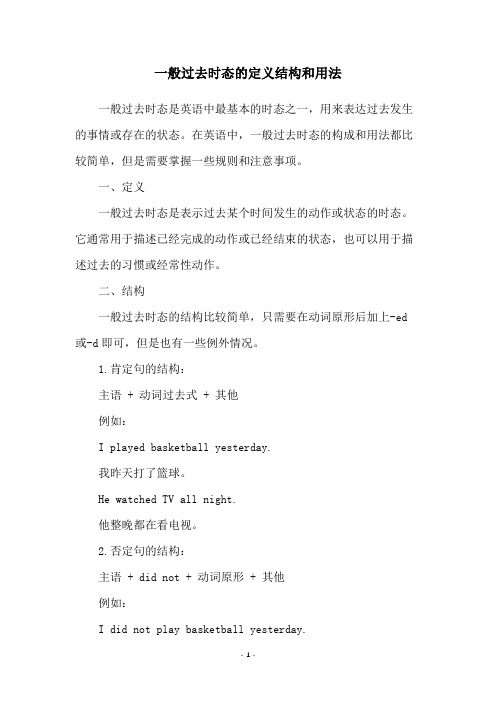
一般过去时态的定义结构和用法一般过去时态是英语中最基本的时态之一,用来表达过去发生的事情或存在的状态。
在英语中,一般过去时态的构成和用法都比较简单,但是需要掌握一些规则和注意事项。
一、定义一般过去时态是表示过去某个时间发生的动作或状态的时态。
它通常用于描述已经完成的动作或已经结束的状态,也可以用于描述过去的习惯或经常性动作。
二、结构一般过去时态的结构比较简单,只需要在动词原形后加上-ed 或-d即可,但是也有一些例外情况。
1.肯定句的结构:主语 + 动词过去式 + 其他例如:I played basketball yesterday.我昨天打了篮球。
He watched TV all night.他整晚都在看电视。
2.否定句的结构:主语 + did not + 动词原形 + 其他例如:I did not play basketball yesterday.我昨天没有打篮球。
He did not watch TV all night.他整晚都没有看电视。
3.疑问句的结构:Did + 主语 + 动词原形 + 其他?例如:Did you play basketball yesterday?你昨天打篮球了吗?Did he watch TV all night?他整晚都在看电视吗?4.特殊情况:有些动词的过去式并不是加-ed或-d,需要特别记忆,例如:go → wentcome → camesee → saweat → ate三、用法一般过去时态的用法比较广泛,主要包括以下几个方面:1.表示过去的动作或状态例如:I visited my grandparents last week.我上个星期去看了我的祖父母。
She was very happy when she got the news.她得知这个消息时非常开心。
2.表示过去的经常性动作或习惯例如:When I was a child, I always played with my friends after school.当我还是个孩子的时候,放学后我总是和我的朋友一起玩。
中考重点一般过去时的构成和用法

中考重点一般过去时的构成和用法一般过去时是英语中最基本的时态之一,用来表示过去发生的动作或状态。
在中考中,掌握一般过去时的构成和用法非常重要。
本文将介绍一般过去时的构成和用法。
一、一般过去时的构成1. 一般过去时的肯定句构成:主语 + 动词过去式 + 其他(宾语、状语等)例如:- She danced beautifully at the party last night.- We played basketball in the park yesterday.2. 一般过去时的否定句构成:主语 + did not (didn't) + 动词原形 + 其他例如:- He didn't watch the movie with us.- They didn't finish their homework on time.3. 一般过去时的疑问句构成:Did + 主语 + 动词原形 + 其他?例如:- Did you go to the zoo on Sunday?- Did she meet her friends at the mall?二、一般过去时的用法1. 表示过去某个时间发生的动作或存在的状态。
例如:- I visited my grandparents last summer.(表示过去某个时间的动作)- She was happy when she got the present.(表示过去某个时间的状态)2. 用于过去的习惯、经常性动作或状态。
例如:- They always went fishing on weekends.(过去频繁发生的动作)- We used to live in the old house.(过去的习惯或状态)3. 与表示过去的时间状语连用,如yesterday, last week, two hoursago等。
例如:- He arrived home late yesterday.(表示过去某个具体的时间)4. 一般过去时的否定形式用于表示过去某动作没有发生。
一般过去时用法描述

一般过去时用法描述一般过去时是英语语法中的一种时态,用于描述发生在过去的动作、事件或状态。
在构成上,一般过去时的动词形式为动词的过去式,通常是动词原形加上-ed结尾,或者根据动词的变化规则来变化。
一般过去时除了描述过去的动作之外,还可以用于表达过去的习惯、习惯性行为或者过去的真实情况。
在进行详细描述时,可以从一般过去时的构成、用法及常见错误等方面进行阐述。
接下来,我们将着重介绍一般过去时的用法,以及一些注意事项。
一、一般过去时的用法:1. 表示过去的动作或事件:一般过去时常用来描述过去发生的动作或事件,例如:- She visited her grandparents last summer.(她去年夏天拜访了她的祖父母。
)- They went to the park yesterday.(他们昨天去了公园。
)2. 表示过去的习惯或习惯性行为:一般过去时也可以用来描述过去的习惯或经常发生的行为,例如:- When I was a child, I played with my friends every day.(我小的时候,每天都和朋友们一起玩。
)- He always helped his mother with the housework.(他总是帮他妈妈做家务。
)3. 表示过去的真实情况:一般过去时还可以用来表示过去的真实情况,例如:- I thought he was a nice person.(我当时以为他是一个好人。
)- The sky was clear and the sun was shining.(天空晴朗,阳光灿烂。
)二、一般过去时的构成:一般过去时的构成主要取决于动词的不规则变化规则和规则变化规则。
不规则动词的过去式形式需要单独记忆,而规则动词的过去式则通常是在动词后面加上了-ed结尾。
以下是一般过去时的构成规则的主要内容:1. 一般动词(regular verbs):- 动词原形+ed结尾,例如:walked, talked, played等。
一般过去时态的动词用法
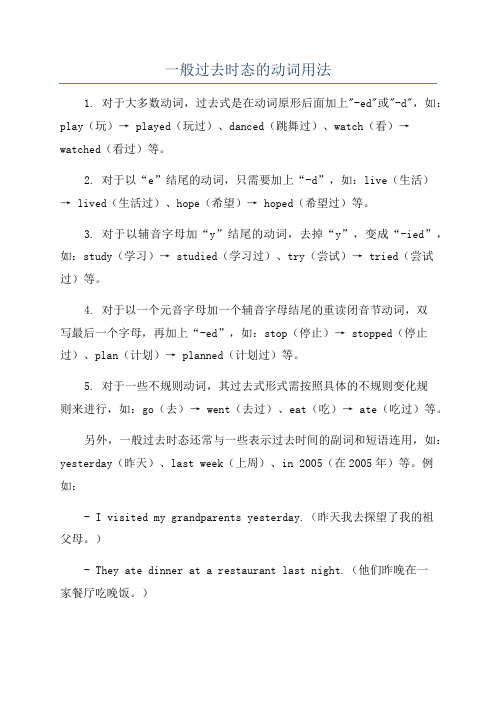
一般过去时态的动词用法
1. 对于大多数动词,过去式是在动词原形后面加上"-ed"或"-d",如:play(玩)→ played(玩过)、danced(跳舞过)、watch(看)→ watched(看过)等。
2. 对于以“e”结尾的动词,只需要加上“-d”,如:live(生活)
→ lived(生活过)、hope(希望)→ hoped(希望过)等。
3. 对于以辅音字母加“y”结尾的动词,去掉“y”,变成“-ied”,如:study(学习)→ studied(学习过)、try(尝试)→ tried(尝试过)等。
4. 对于以一个元音字母加一个辅音字母结尾的重读闭音节动词,双
写最后一个字母,再加上“-ed”,如:stop(停止)→ stopped(停止过)、plan(计划)→ planned(计划过)等。
5. 对于一些不规则动词,其过去式形式需按照具体的不规则变化规
则来进行,如:go(去)→ went(去过)、eat(吃)→ ate(吃过)等。
另外,一般过去时态还常与一些表示过去时间的副词和短语连用,如:yesterday(昨天)、last week(上周)、in 2005(在2005年)等。
例如:
- I visited my grandparents yesterday.(昨天我去探望了我的祖
父母。
)
- They ate dinner at a restaurant last night.(他们昨晚在一
家餐厅吃晚饭。
)
- She lived in Paris for a year in 2024.(她在2024年在巴黎生活了一年。
【英语】必备英语一般过去时技巧全解及练习题(含答案)及解析
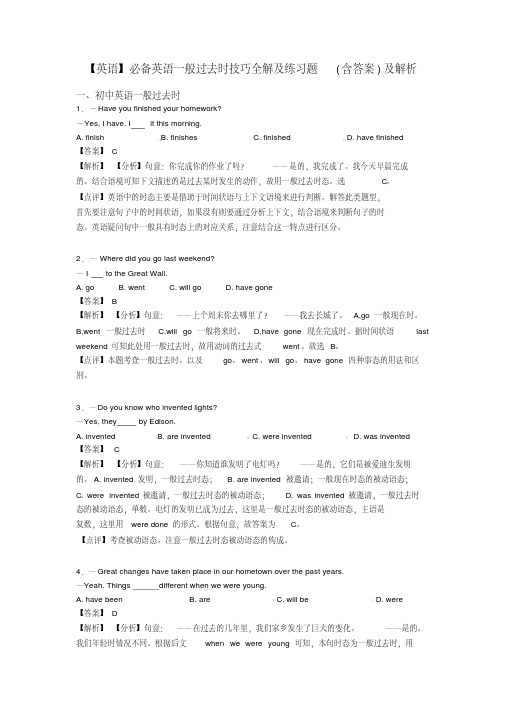
【英语】必备英语一般过去时技巧全解及练习题(含答案)及解析一、初中英语一般过去时1.-Have you finished your homework?-Yes, I have. I it this morning.A. finishB. finishesC. finishedD. have finished【答案】C【解析】【分析】句意:你完成你的作业了吗?——是的,我完成了。
我今天早晨完成的。
结合语境可知下文描述的是过去某时发生的动作,故用一般过去时态。
选C。
【点评】英语中的时态主要是借助于时间状语与上下文语境来进行判断。
解答此类题型,首先要注意句子中的时间状语,如果没有则要通过分析上下文,结合语境来判断句子的时态。
英语疑问句中一般具有时态上的对应关系,注意结合这一特点进行区分。
2.— Where did you go last weekend?— I to the Great Wall.A. goB. wentC. will goD. have gone【答案】B【解析】【分析】句意:——上个周末你去哪里了?——我去长城了。
A,go一般现在时。
B,went一般过去时C,will go一般将来时。
D,have gone现在完成时。
据时间状语last weekend可知此处用一般过去时,故用动词的过去式went。
故选B。
【点评】本题考查一般过去时。
以及go、went、will go、have gone四种事态的用法和区别。
3.—Do you know who invented lights?—Yes, they by Edison.A. inventedB. are inventedC. were inventedD. was invented【答案】 C【解析】【分析】句意:——你知道谁发明了电灯吗?——是的,它们是被爱迪生发明的。
A. invented发明,一般过去时态; B. are invented被邀请;一般现在时态的被动语态;C. were invented被邀请,一般过去时态的被动语态;D. was invented被邀请,一般过去时态的被动语态,单数。
英语一般过去时技巧(很有用)及练习题及解析

英语一般过去时技巧(很有用)及练习题及解析一、初中英语一般过去时1.He to play sports, but now he is interested in soccer and volleyball.A. doesn't useB. wasn't usedC. didn't useD. didn't used【答案】 C【解析】【分析】句意:他______做运动,但是现在他对足球和排球很感兴趣。
根据句意和选项可知此题考查一般过去时态的否定句式didn't+动词原形,故选C。
【点评】此题考查一般过去时态的否定句式,平时应多归纳总结各种时态,语态和句式的结构及用法。
2.— Where did you go last weekend?— I to the Great Wall.A. goB. wentC. will goD. have gone【答案】B【解析】【分析】句意:——上个周末你去哪里了?——我去长城了。
A,go一般现在时。
B,went一般过去时C,will go一般将来时。
D,have gone现在完成时。
据时间状语last weekend可知此处用一般过去时,故用动词的过去式went。
故选B。
【点评】本题考查一般过去时。
以及go、went、will go、have gone四种事态的用法和区别。
3.— Are you a basketball player in your school ?— Yes. I ______________ the team 3 years ago. I ______________ in it for 3 years.A. joined; wasB. was joined; amC. have joined; have beenD. joined; have been【答案】 D【解析】【分析】句意:——你是你们学校的篮球运动员吗?——是的,三年前我加入了这个团队,我在里面呆了3年。
一般过去时的用法及结构笔记

一般过去时的用法及结构笔记(实用版)目录I.一般过去时简介1.时间含义2.结构特点II.一般过去时的结构1.动词变化规则2.其他语法规则III.一般过去时在句子中的使用1.陈述句2.疑问句3.否定句IV.一般过去时与其它时态的比较1.现在完成时2.过去完成时3.将来时正文一、一般过去时简介一般过去时是一种表示过去某个时间点发生过的事情的时态。
它强调的是过去某个时间点,而非持续性的动作或状态。
在中文中,一般过去时通常使用“了”来表示。
例如,“我昨天去了公园。
”这句话就使用了“了”来表示发生在昨天的一个动作。
二、一般过去时的结构一般过去时的结构包括动词的变化和其他语法规则。
1.动词变化规则:一般过去时通常使用动词原形,没有加-ed或-ing 的形式。
例如,“I walked to school yesterday.”中的“walked”就是动词原形,没有加-ed的形式。
2.其他语法规则:一般过去时还涉及到一些其他的语法规则,例如时间状语的用法、否定句和疑问句的构造等。
例如,“I didn"t watch the movie yesterday.”中的“watch”是动词,没有加-ed的形式,表示在过去某个时间点发生的一个动作。
三、一般过去时在句子中的使用一般过去时在句子中可以用来表达陈述、疑问、否定等含义。
例如,“I had a great time yesterday.”这句话就是一个陈述句,表示“我”在过去某个时间点度过了一段美好的时光。
而“Did you watch the game yesterday?”则是一个疑问句,表示“你”是否观看了比赛。
而“I didn"t finish my homework.”则是一个否定句,表示“我”没有完成作业。
四、一般过去时与其它时态的比较一般过去时与其它时态相比较,有以下几种比较:1.与现在完成时比较:现在完成时强调的是过去的动作对现在造成的影响和结果,而一般过去时则没有这个含义。
英语一般过去时技巧和方法完整版及练习题含解析

英语一般过去时技巧和方法完整版及练习题含解析一、初中英语一般过去时1.—When _______ you _______ your homework?—I had finished it before he _______ back.A. have; finished; cameB. have; finished; was comingC. did; finish; cameD. did; finish; was coming【答案】 C【解析】【分析】考查时态。
根据语境知,询问的是完成作业的时间,故用一般过去时。
句意:——你什么时候完成的作业?——在他回来之前我就完成了。
故选C。
2.—Linda hasn't come to the party yet.—But she . I think I have to call her again.A. promisesB. promisedC. will promise【答案】 B【解析】【分析】句意:——琳达还没来参加聚会。
——但她答应了。
我想我得再给她打个电话。
根据 I think I have to call her again. 我得再给她打个电话。
可知她答应了,应用一般过去时,故选B。
【点评】考查动词一般过去时的用法。
3.In February, Chinese tech company Huawei ________ Mate X, a foldable (可折叠的) 5G mobile phone.A. is introducingB. introducedC. introducesD. was introduced【答案】 B【解析】【分析】句意:二月,中国科技公司华为介绍Mate X,一款可折叠5G手机。
根据In February,可知陈述过去的事情,用一般过去时,谓语动词用过去式,introduce介绍,其过去式是introduced,故选B。
一般过去时态的定义结构和用法
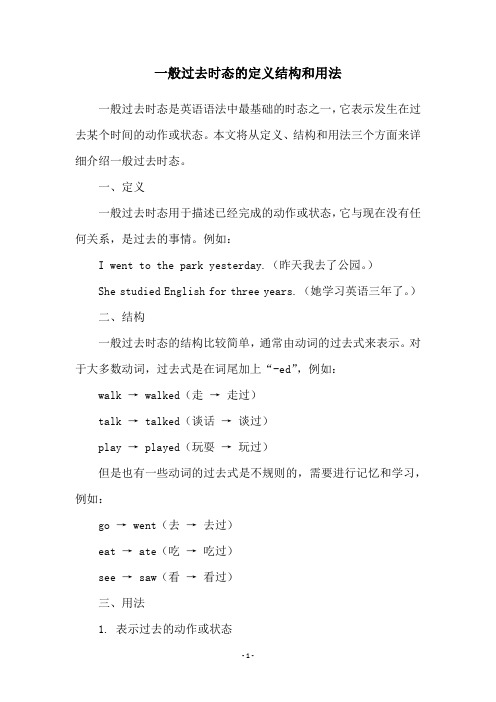
一般过去时态的定义结构和用法一般过去时态是英语语法中最基础的时态之一,它表示发生在过去某个时间的动作或状态。
本文将从定义、结构和用法三个方面来详细介绍一般过去时态。
一、定义一般过去时态用于描述已经完成的动作或状态,它与现在没有任何关系,是过去的事情。
例如:I went to the park yesterday.(昨天我去了公园。
)She studied English for three years.(她学习英语三年了。
)二、结构一般过去时态的结构比较简单,通常由动词的过去式来表示。
对于大多数动词,过去式是在词尾加上“-ed”,例如:walk → walked(走→走过)talk → talked(谈话→谈过)play → played(玩耍→玩过)但是也有一些动词的过去式是不规则的,需要进行记忆和学习,例如:go → went(去→去过)eat → ate(吃→吃过)see → saw(看→看过)三、用法1. 表示过去的动作或状态一般过去时态最常见的用法是描述过去发生的动作或状态,例如: I watched a movie last night.(昨晚我看了一部电影。
)He was very happy when he got the news.(当他得到那个消息时他非常高兴。
)2. 表示过去的习惯或经常性动作一般过去时态也可以表示过去的习惯或经常性动作,通常需要用副词或时间状语来说明。
例如:When I was a child, I often played with my friends after school.(当我还是个孩子的时候,放学后我经常和我的朋友们玩。
) She always drank coffee in the morning.(她总是在早上喝咖啡。
)3. 表示过去的条件语句一般过去时态也可以用于表示过去的条件语句,通常需要用“if”引导。
例如:If I had known the truth, I would have done things differently.(如果我当时知道真相,我会做出不同的选择。
一般过去时的用法及结构
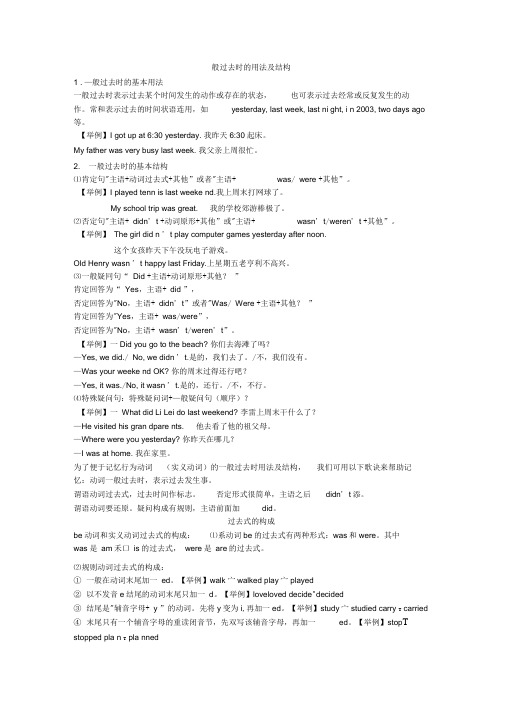
般过去时的用法及结构1 .—般过去时的基本用法一般过去时表示过去某个时间发生的动作或存在的状态,也可表示过去经常或反复发生的动作。
常和表示过去的时间状语连用,如yesterday, last week, last ni ght, i n 2003, two days ago 等。
【举例】I got up at 6:30 yesterday. 我昨天6:30起床。
My father was very busy last week. 我父亲上周很忙。
2. 一般过去时的基本结构⑴肯定句"主语+动词过去式+其他”或者"主语+ was/ were +其他”。
【举例】I played tenn is last weeke nd.我上周末打网球了。
My school trip was great. 我的学校郊游棒极了。
⑵否定句"主语+ didn' t +动词原形+其他”或"主语+ wasn' t/weren' t +其他”。
【举例】The girl did n ' t play computer games yesterday after noon.这个女孩昨天下午没玩电子游戏。
Old Henry wasn ' t happy last Friday.上星期五老亨利不高兴。
⑶一般疑冋句“ Did +主语+动词原形+其他?”肯定回答为“ Yes,主语+ did ”,否定回答为"No,主语+ didn' t”或者"Was/ Were +主语+其他?”肯定回答为"Yes,主语+ was/were”,否定回答为"No,主语+ wasn' t/weren' t”。
【举例】一Did you go to the beach? 你们去海滩了吗?—Yes, we did./ No, we didn ' t.是的,我们去了。
英语一般过去时技巧(很有用)及练习题含解析

英语一般过去时技巧(很有用)及练习题含解析一、初中英语一般过去时1.Jake _____his key in the office so he had to wait until his wife _______ home.A. has forgotten … comesB. forgot… comeC. had left… cameD. had left…would come【答案】 C【解析】【分析】句意:杰克把他的钥匙丢在办公室了,因此他不得不等到他的妻子回家。
结合语境可知前文描述的是过去某时前已经完成的动作,故用过去完成时态。
下文指的是过去某时的动作,故用一般过去时态。
选C。
【点评】英语中的时态主要是借助于时间状语与上下文语境来进行判断。
解答此类题型,首先要注意句子中的时间状语,如果没有则要通过分析上下文,结合语境来判断句子的时态。
2.The car suddenly _________ on the road and went out of control. Finally, it was seen _________ into the wall of the building.A. was broken down; crashB. broke down; crashC. was broken down; to crashD. broke down; to crash【答案】 D【解析】【分析】句意:汽车在路上突然加速,失去了控制。
最后,人们看到它撞到了建筑物的墙壁上。
break down和主语car是主动关系,故排除A和C,be seen to do,固定搭配,被看到做某事,故用不定式,故选D。
【点评】考查语态和固定搭配,注意be seen to do的用法。
3.-Have you ever been to Xiamen?-Yes. I _ there in 2013.A. goB. wentC. have gone【答案】 B【解析】【分析】句意:一你去过厦门吗?一是的,我2013年去的。
【英语】英语一般过去时试题类型及其解题技巧

【英语】英语一般过去时试题类型及其解题技巧一、初中英语一般过去时1.— The hen ___________ three eggs yesterday.— It's amazing.A. lieB. layC. lainD. laid【答案】D【解析】【分析】——昨天那个母鸡下了三个蛋。
——真令人惊奇。
下蛋:lay eggs, yesterday是昨天的意思,和一般过去时连用,lay的过去式是laid, lie: 躺,撒谎,lay:lie 的过去式,或放,下蛋,lain是lie的过去分词,故选D。
【点评】考查动词辨析。
熟记这几个词的区别和意义。
2.—Linda is not coming for the party tonight.—But she _.A. promisesB. promisedC. will promiseD. had promised【答案】 B【解析】【分析】句意:——琳达今晚不会来聚会。
——但是她答应了啊。
根据前一句可知“她答应”发生在说话之前,故用一般过去时,因此选B。
【点评】考查动词的时态。
3.The traffic was heavy this morning, but Dad________ to get to the office on time.A. managesB. managedC. would manageD. will manage【答案】 B【解析】【分析】句意:今天早上交通非常繁忙,但爸爸设法按时赶到了办公室。
根据The traffic was heavy this morning.可知,本句时态为一般过去时,动词“设法”manage的过去式为managed。
故选B。
【点评】考查一般过去时,注意判断句子的时态,选择正确答案。
4.—Great changes have taken place in our hometown over the past years.—Yeah. Things ______different when we were young.A. have beenB. areC. will beD. were【答案】D【解析】【分析】句意:——在过去的几年里,我们家乡发生了巨大的变化。
- 1、下载文档前请自行甄别文档内容的完整性,平台不提供额外的编辑、内容补充、找答案等附加服务。
- 2、"仅部分预览"的文档,不可在线预览部分如存在完整性等问题,可反馈申请退款(可完整预览的文档不适用该条件!)。
- 3、如文档侵犯您的权益,请联系客服反馈,我们会尽快为您处理(人工客服工作时间:9:00-18:30)。
一般过去时
一般过去时:表示过去某一时间发生的动作或者存在的状态。
一般过去时的动词使用动词过去式。
动词原形变动词过去式的变化规则:
1)一般直接在动词后面加上ed. 例如:
work(工作)---worked; play(玩)---played;
look(看)---looked; wait(等待)----waited;
2)以e结尾的动词,加d. 例如:
dance---danced(跳舞); like---liked(喜欢)
Move---moved(移动); close---closed(关闭)
3)以辅音字母+y结尾的动词,将y变成ied.例如:
study---studied(学习); carry---carried(扛)
4)以重读闭音节结尾且词尾只有一个辅音字母的动词,双写这个辅音字母再加ed. 例如:stop---stopped(停止); plan----planned(计划);
5)不规则:(小学期间参考六年级下册课本第69页内容,只能全部死记下来)例如:
go---went(去);come---came(来);have---had(有);do---did(做)
下面我们来看几个例句:
例如:
1) Smiths一家上周去北京了。
The Smiths went to Beijing last week.
2) 去年我住在上海。
I lived in Shanghai last year.
3)那个老人三年前在学校里教数学。
That old man taught maths at school three years ago.
4)我上周六去看了一场篮球赛。
I watched a basketball match last Saturday.
练习题:
一、写出下列动词的过去式:
make--- watch--- read--- fly--- talk--- fix--- study--- do--- have--- play--- eat---- drink--- work--- snow--- walk--- talk--- dance--- like---- carry--- draw--- wash--- know--- run--- come--- ride--- sit--- shop--- cut--- get--- go--- write--- swim--- put----
二、请翻译下列句子:
1)你上周末做了什么?我周六的时候打扫我的房间。
2)上周一你和张鹏一起踢足球了吗?
3)我周末和你奶奶待在家里。
4)我们昨天下午喝茶还有看电视。
5)Helen上周末去书店买了电影杂志。
6)上周六你去看了电影吗?
7)昨天我们的好朋友Robin修好了一把破椅子。
8)两年前你住在上海吗?
9)昨天我爸爸去酒店厨房买了一些汉堡,但是都是冷的而且很难吃。
10)昨天我们想看电视但是电视机是坏的。
11)上周末我去看望了我的祖父母亲。
三、句型转换:
1. He came here last month.
否定句:______________________________________
一般疑问句:______________________________________ 2. They played football yesterday.
否定句:______________________________________
一般疑问句:______________________________________
肯定回答:____________________________________
否定回答:___________________________________
3. They went to Beijing last year. (就划线部分提问)
________________________________________________ 4. Mary does her homework every day. (将every day 改为last night). __________________________________________________ 5. My mom bought a bike for me 2 days ago.
否定句:______________________________________
一般疑问句:______________________________________
肯定回答:____________________________________
否定回答:___________________________________
6. I got up late yesterday morning.
否定句:______________________________________
一般疑问句:______________________________________
肯定回答:____________________________________
否定回答:___________________________________
7. He cleans his room every day. (将every day 改为yesterday.)
____________________________________________
四、用适当的词填空。
1. We__________(enjoy) ourselves at the beach yesterday.
2. ______you___________(go) the Great Wall last year?
3. What day________(is) it yesterday?
4. I __________(watch) TV last night.
5. He __________(buy) a pencil case yesterday.
6. We_________(visit) the science museum and __________(have) a great time.
7. The old man___________(be) ill and _______(go) to see a doctor yesterday.
8. -How was your weekend?
-It_______(be)great.
9. -What_______she_________(do) last weekend?
-She __________(go)to the bookstore.
10. He__________(not do) his homework last night.。
